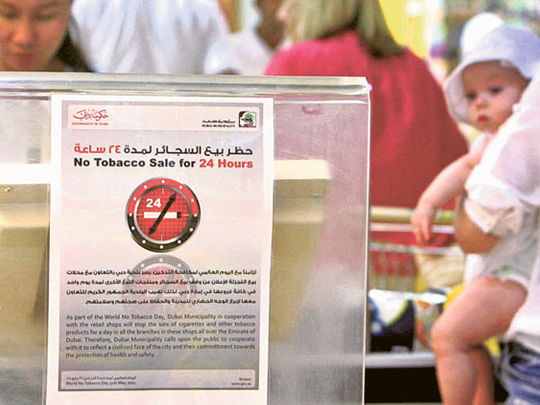
Dubai: Nearly 500 shops will stop selling tobacco products for 24 hours on Saturday — a jump from 420 in 2013 — in a bid to support World No Tobacco Day.
The move is aimed at educating the public about the harmful impact of smoking and its related diseases.
“Our initiative is aimed at highlighting the health risks associated with tobacco use and advocating for effective policies to reduce tobacco consumption,” said Marwan Al Mohammad, Director of Public Health and Safety Department at Dubai Municipality.
The participants this year include Emirates, ENOC and EPPCO petrol stations, Hyper Panda, Al Safeer, Spinney’s, Waitrose, Carrefour, Zoom, Choithram, Lulu, Maya, Family, and West Zone.
All 500 outlets will completely stop the sale of all types of tobacco throughout the emirate of Dubai for 24 hours from Friday midnight to Saturday midnight.
“The campaign mainly targets youth as most of the people start smoking at an early age. The campaign focuses on the importance of healthy lifestyle, and also highlights the efforts of the municipality in providing free treatment to employees who are smokers and follow up until they quit,” he said.
Dr Sami Mana, Community Medicine Specialist at the Dubai Health Authority, said that on an average, each clinic receives 150 to 200 patients per year.
“In 2013, we achieved a smoking cessation rate of 14 per cent and we are continuing our efforts in this direction. The clinic caters to people who want to quit smoking by addressing their individual problems and by giving them medical and psychological support,” said Dr Mana.
Through its Twitter portal @DHA_Dubai, smoking cessation specialists on Thursday disseminated vital information with an aim to educate the community about its various smoking cessation programs.
He explained that the clinic reaches out to smokers to help them cope with nicotine withdrawal symptoms, which is a factor that often dissuades them from stubbing the habit.
Dr Mana pointed out that cigarette smoking is the number one risk factor for lung cancer and that tobacco smoke is a mix of more than 4,000 chemicals, of which 250 are toxic and at least 50 are known to cause cancer.
“Patients need most support when they experience these symptoms which can include nervousness, irritability, headaches, insomnia, and tiredness,” he said.












